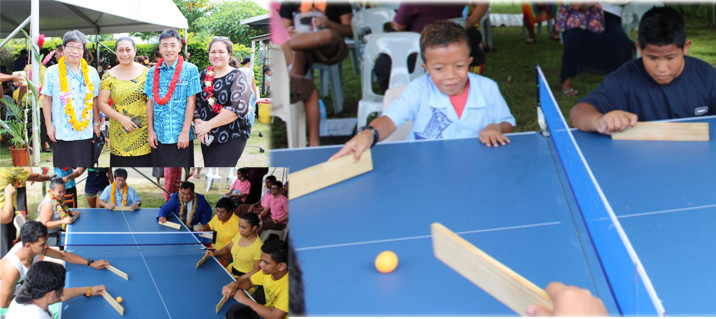Students of SENESE School, Vaitele, enjoyed a sporting moment when the Japanese International Agency (JICA) made it possible for them to play volleyball and football a few days ago.
JICA donated $20,000 worth of sporting equipment to the school for the children to play Takkyu Volleyball and Blind football.
Credit for making the assistance possible went to Ms Puaseisei Seve who submitted an Action Plan to the JICA Samoa Office as a SENESE Schoolteacher.
Students are able to play the selected sports with the use of 48 rackets, 4 table tennis, 12 Takkyu volleyballs, 5 blind football balls.
Included also were 48 folding chairs.
Ms. Seve made the request for assistance after she was nominated and endorsed by the Ministry of Foreign Affairs and Trade as Samoa’s representative to the JICA’s Knowledge Co-Creation Program (KCCP) for capacity building on “Promotion of Social Participation of Persons with Disability through Sports.”
She was one of the participants from 11 other countries in 2019.
JICA Resident Representative, Mr Akihiko Hoshino, expressed his gratitude and acknowledged Ms. Seve’s determination and desire through her Action Plan, which aimed at not only introducing the two new sports in Samoa, but also strongly promoting participation for people with disabilities through sports.
“I hope that the knowledge she obtained in Japan will assist in promoting sports participation of people with disabilities, and developing the two new sports in Samoa to help bring people together”, said Mr Hoshino.
In speaking about Takkyu volley sport, she said, “I had no idea what Takkyu volley was before I went to Japan.
“I had never heard of it before until I got there”.
While in Japan, Ms. Seve took part in the Amateur Cup Takkyu Volley Tournament in Kyoto City.
“It was a really big tournament and it was there that I saw how inclusive this sport is.
“I was amazed with many people coming together to compete, socialize and have fun – people with and without disabilities”.
SENESE is in arrangement to schedule rollout trainings in both Upolu and Savaii promoting the two new sports as an educational tool to bring everyone together with or without disabilities.
“In fact, sport is education, sport is health, sport is friendship, and sport is life. Thus, sport can bring everyone together”, said Ms. Seve.
“When I was in Japan, the aim of the Japan Takkyu Volley Federation is to promote takkyu volley to the Special Olympic Games and the Paralympics Games. My goal and if it happens in the future, hopefully we have a team from Samoa to compete in these competitions”.
Participants of the Takkyu sport demonstration included students and representatives from Loto Taumafai, Aoga Fiamalamalama, Special Olympic Samoa, SASNOC, Nuanua o le Alofa (NOLA), Deaf Association of Samoa (DAS), Samoa Blind People Association (SBPA), and National Rugby League (NRL).
HISTORY: Takkyu Volley
Takkyu Volley means table tennis volley. It has been practiced in Japan in the 1970s with Naitakkyu Special School in Kyoto took the lead in creating the rules and developing the equipment for Takkyu volley in 1974. In 1976, the same special school in Kyoto City introduced Takkyu volley to Kyoto Disability Sports Promotion Association as a sport for people with physical disabilities including those with severe physical disabilities. In 1981, Takkyu volley was adopted as a team’s sport but it was under the table tennis division. At the time, Takkyu volley was not an independent sport. They were using (more likely) table tennis rules. In 1988, the Kyoto Disability Sports Promotion Association published the rules for Takkyu volley. In 1989, Takkyu volley became independent from table tennis division and where it became a sport itself with its own rules and equipment. In 2008, Japan Takkyu Volley Federation was established. In 2009, the Japan Takkyu Volley Federation renewed and republished (officially) the Takkyu volley rules.
RULES: Takkyu Volley
The sport uses pinball, (contains small rounded lead inside) which is rolled over a table tennis table. Each team consists of six players. Rules are quite similar to volley ball except the ball is rolled under the net.
